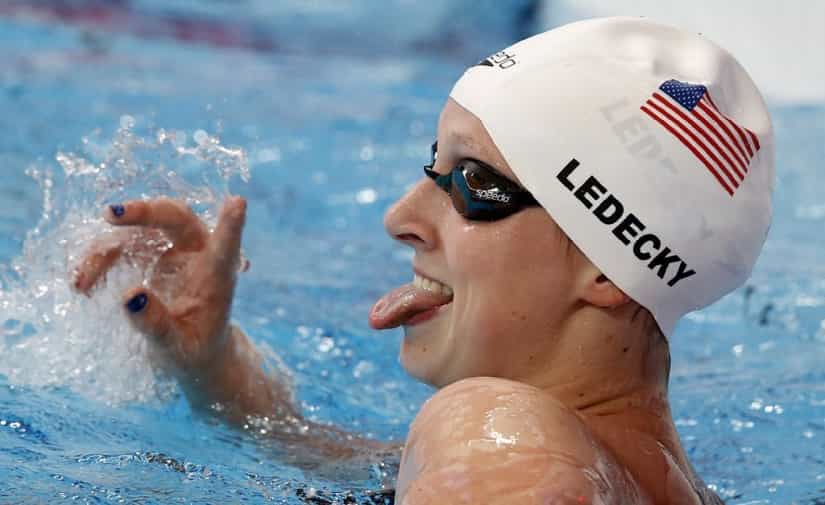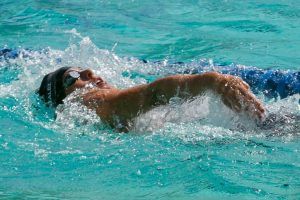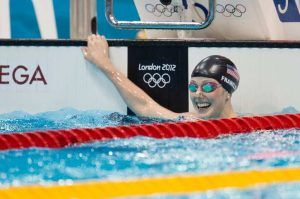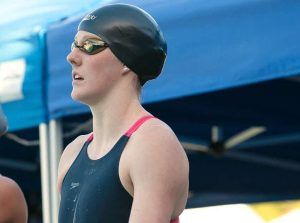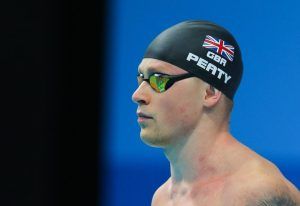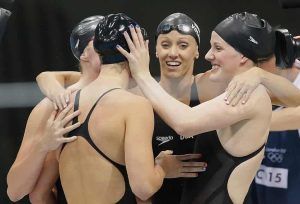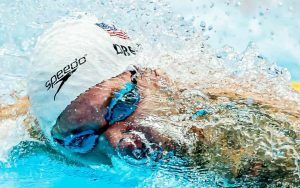“One thing about swimming that people don’t really know, is that the work you put in practice shows off in the meet.” – Katie Ledecky
If you were watching the Rio Olympics (and I know you were!), you were witness to Katie Ledecky taking the women’s freestyle events and make them all do her laundry AND give her their lunch money.
It was simply awesome to watch.
Her performance solidified her place as the top female swimmer on the planet.
And during the events you heard commentators, analysts and anyone with a microphone talk about how special she is.
How talented and gifted she is…
How her technique is 12% more efficient, and this, that, and the other thing.
But there was one thing they didn’t talk about.
And that’s because it’s doesn’t fit into the vignettes and narratives of Olympics coverage.
After all, we lionize these swimmers to the point that they might as well be from outer space.
(Phelps in particular…)
But if you read about her backstory, and learn there is a “gift” or “talent” that Ledecky has that has nothing really to do with being talented or gifted.
Let me explain.
When Hard Work is Fun Awesomeness Ensues
As a six year old, at a local meet Ledecky competes in a 25-yard race. Several times over the course of a the one-lap race she stops to hang on the lane rope.
She struggles to complete the race, and when she does, her dad has a video camera to capture:
“Tell me about your first race. How was it?”
“Great,” she says, beaming. “That was hard!”
Bruce Gemmell, in recounting this story in Angela Duckworth’s book Grit (Amazon), notes that this is the attitude she has with training and competition to this day.
For Ledecky, hard work is in itself the reward. The challenge is—dare we say it—fun.
“Her strength is not in any physical attribute. It’s not even in any particular technique. It’s her overwhelming desire to do what she needs to do to get better.”
Keep an Eye on Your Goals
Even though she won’t admit precisely where she keeps her goals written, Ledecky has been setting and demolishing goals since she was young.
In 2013, after a monster world championships where she cruised to world records in the 800m and 1500m freestyles, Ledecky and Coach Gemmell sat down and set goals for the next three years, including Rio.
See Also: Want to See What Katie Ledecky’s Main Sets Look Like? Here Ya Go
The focus on her goals, and what is needed to accomplish them, are what helps her stay focused and calm on the biggest stages the sport has to offer.
“When I was a kid, I would write them down, and I would work toward them, and that’s still pretty much what I do.”
A Willingness to Fail
The term “hard work” is a bit vague, isn’t it? Without something concrete to measure it’s a bit open ended.
Our coaches, parents and teachers have all told us over and over again that hard work pays off. It’s implied that if we work hard good things will happen.
For Ledecky, it’s not enough to work hard, it’s about being willing to fail, to push herself to the point of failure over and over again and not get discouraged.
Although this might sound simplistic, a lot of athletes have a hard time with doing this. It’s taxing mentally and physically to push and stretch ourselves consistently to a breaking point.
It requires leaving your comfort zone, to push yourself beyond what is normal or familiar, and it is just as tough mentally to do so as it is to do so physically.
“There are days she fails catastrophically,” he said. “She fails in practice more than anybody in her [training] group, because she’ll start out like, ‘This is the pace I need to swim in the race, so I need to replicate it in practice.’ And she’ll go six repeats like that, and the tank goes empty and she just falls off. But you know what? She’ll come back the next day and try it again. And on the third day, she’ll nail it. And she’s been doing this since the first day I walked on the deck with her.”
See Also: How Katie Ledecky Took Her Training to the Next Level with a Logbook
Mental Toughness is Developed in Practice
For most swimmers the idea of being mentally tough is something they only really think about during competition. But to gain the kind of durability and confidence in competition you need to have invested the hard work and challenge in practice.
Ledecky’s competitive fire is visible in competition, but what helps distance her from the competition is bringing that competitive rage to practice each day.
“You look at Katie, just like with Michael, and you realize the differentiator is between the ears. And their hearts. Their appetite for competition, their unwillingness to lose, and their embracing the challenge. And not just the challenge on competition day, which is a huge part, but the challenge of the training grind,” says Gemmell.
How to Train Like Ledecky
Very few of us will ever experience the dizzying heights of success that Ledecky has already attained as a 19-year old. (None of us, actually.)
But we can take some of the mental approach that she uses for our own goals in the pool.
Set challenging goals for yourself in training. It’s not enough to have big goals for the season—that’s the easy part. Have goals for training, a specific race pace or stroke count, for example, and hammer away at them until you master them. And when you do, set yourself a new, more challenging bar to rise towards.
Don’t back away from challenges. Your training program should ask more from you. Not just your best, but a shade more. Failing is what practice is for. Sure, saying that you won’t back down from challenges is practice is easier said than done, but that kind of resilience is a hallmark of championship athletes.
Be competitive in practice. Some swimmers seem to be just born to have that racer’s edge. And while some swimmers come by it more naturally than others, it is something that can be developed in practice. Being competitive with yourself and with your teammates in practice not only fosters an environment in training that demands the best of everyone, but it will help hone the competitive instinct that will come in handy when you are stepping up on the blocks.
At the end of the day, Ledecky’s success isn’t extraterrestial (even though her times sure are).
Gemmell is adamant that there isn’t any secret sauce, or magic trick, or silver bullet.
“Just do the damn work,” is his advice.
See More:
- 36 Epic Swim Practices for Competitive Swimmers. Ready to try out some of the same sets that Ledecky, Phelps and Lochte have done on their way to becoming elite? Give one or more of these workouts a go.
- 9 Drills for a Faster Freestyle. Auburn head coach Brett Hawke shares a couple videos that will help you get your freestyle game on point.

